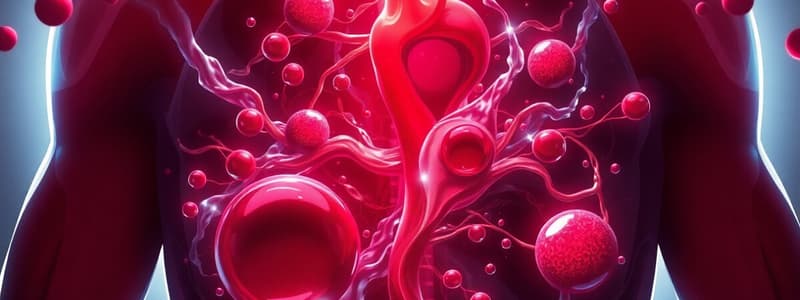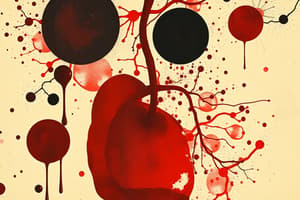Podcast
Questions and Answers
What percentage of plasma is made up of water?
What percentage of plasma is made up of water?
- 55%
- 90-92% (correct)
- 20-25%
- 6-8%
Which of the following proteins is NOT a major component of blood plasma?
Which of the following proteins is NOT a major component of blood plasma?
- Fibrinogen
- Globulins
- Albumins
- Hemoglobin (correct)
Which type of lymphocyte is responsible for producing antibodies?
Which type of lymphocyte is responsible for producing antibodies?
- B lymphocytes (correct)
- Platelets
- T lymphocytes
- Red blood cells
What is the primary function of platelets in the blood?
What is the primary function of platelets in the blood?
Which of the following organisms primarily uses blood as their transport fluid?
Which of the following organisms primarily uses blood as their transport fluid?
Which of the following statements about lymphocytes is correct?
Which of the following statements about lymphocytes is correct?
What condition might occur as a result of a reduction in platelet count?
What condition might occur as a result of a reduction in platelet count?
In which body fluid do most higher organisms, including humans, transport substances?
In which body fluid do most higher organisms, including humans, transport substances?
Flashcards
Blood composition
Blood composition
Blood is a connective tissue composed of a fluid matrix called plasma, and formed elements.
Plasma's composition
Plasma's composition
Plasma, the liquid part of blood, is mostly water (90-92%) and contains proteins like fibrinogen, globulins, and albumins.
Blood's formed elements
Blood's formed elements
Components of blood that are not liquid, including red blood cells (erythrocytes), white blood cells (leukocytes), and platelets (thrombocytes).
Platelets' function
Platelets' function
Signup and view all the flashcards
Lymphocytes role
Lymphocytes role
Signup and view all the flashcards
Tissue fluid (lymph)
Tissue fluid (lymph)
Signup and view all the flashcards
Simple organisms circulation
Simple organisms circulation
Signup and view all the flashcards
Circulatory systems' need
Circulatory systems' need
Signup and view all the flashcards
Study Notes
Body Fluids and Circulation
- Living cells require nutrients, oxygen, and removal of waste.
- Organisms use transport mechanisms to move these substances.
- Simple animals like sponges and coelenterates use water circulation.
- Complex animals use body fluids for transport.
- Blood is the main transport fluid in higher organisms, including humans.
- Lymph also assists in transporting substances.
Blood Composition
- Blood is a connective tissue with a fluid matrix (plasma) and formed elements.
- Plasma (55% of blood):
- Straw-colored, viscous fluid.
- 90-92% water, 6-8% proteins (fibrinogen, globulins, albumins).
- Formed elements:
- Red blood cells (erythrocytes): Transport oxygen.
- White blood cells (leukocytes): Involved in immunity. Various types like neutrophils, lymphocytes, monocytes etc.
- Neutrophils (60-65%): Important in the initial stages of infection.
- Lymphocytes (20-25%): Crucial for immune responses, two major types - 'B' and 'T' lymphocytes.
- Platelets (thrombocytes): Cell fragments, involved in blood clotting. (1,500,000-3,500,000 platelets mm⁻³ ).
- Release clotting factors. Reduced numbers lead to bleeding disorders.
Studying That Suits You
Use AI to generate personalized quizzes and flashcards to suit your learning preferences.




